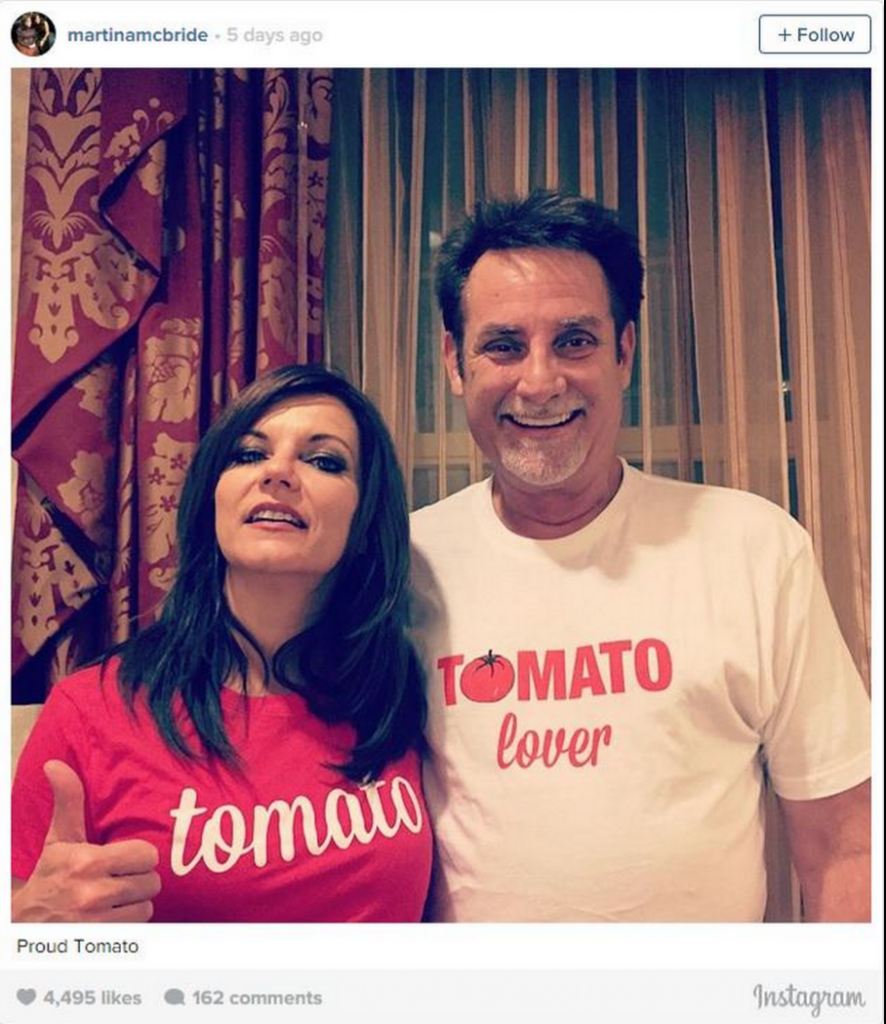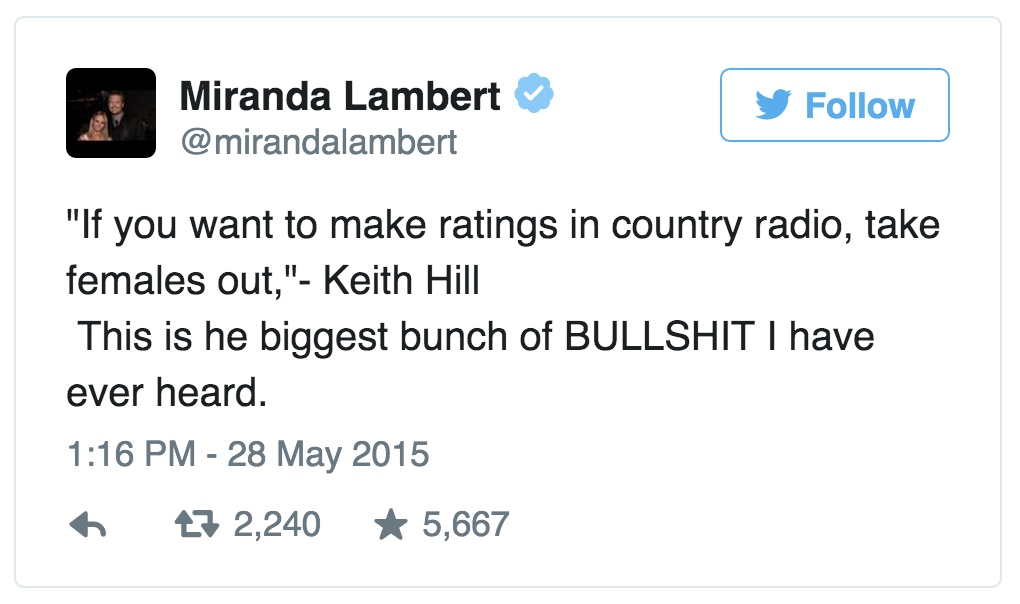#SaladGate: When Social Media Disrupts an Insular Media Culture

Post by David Crider, State University of New York at Oswego
As someone who has previously written for Antenna about country music radio’s gender problem, I have been following the “#SaladGate” situation pretty closely. For those who are not familiar, longtime radio consultant Keith Hill was recently explaining his winning strategies in Country Aircheck Weekly. Hill stated that one way to improve ratings is to decrease the number of females on the playlist to around 15-percent. He concluded, “They’re just not the lettuce in our salad. The lettuce is Luke Bryan and Blake Shelton, Keith Urban and artists like that. The tomatoes of our salad are the females.” Well-known female country artists Miranda Lambert and Martina McBride took umbrage to Hill’s comments, and their fan bases followed suit, attacking Hill via e-mail and social media.
Hill has been on the defensive ever since, falling back on his 40 years of experience with music programming and consulting. He addressed many of his detractors directly via Twitter, and then appeared on the Radio Stuff Podcast to explain his strategy and his side of the situation. At one point in the interview, Hill noted that he had created a Twitter account during a convention panel six years ago, then never used it again until recently when the angry #SaladGate tweets started coming in. He added that the country radio audience is 55 to 65 percent female, and until now they were happy with what they heard. It was only when they were exposed to the internal data that they started to think the format was biased.
 It seems to me that this is a classic case of disruption brought about by digital and social media and greater media literacy. Radio is a very insular media culture, driven by the same research metrics that have been used for decades. The Keith Hills of the world fall back on what has always worked because they see no reason to change. Fear drives their programming decisions; if they try something new or different, they could lose listeners. Until recently, they were immune from direct criticism because they worked behind the scenes and had much more anonymity than on-air personalities, who serve as the public voices of the industry. The rise of Twitter and Facebook has brought listeners to the gates of this insular radio industry, allowing them to shout, “Listen to us!” When listeners don’t like something, they can let radio management know, immediately and directly. Naturally, this development will knock a practitioner of ingrained methods off his/her axis.
It seems to me that this is a classic case of disruption brought about by digital and social media and greater media literacy. Radio is a very insular media culture, driven by the same research metrics that have been used for decades. The Keith Hills of the world fall back on what has always worked because they see no reason to change. Fear drives their programming decisions; if they try something new or different, they could lose listeners. Until recently, they were immune from direct criticism because they worked behind the scenes and had much more anonymity than on-air personalities, who serve as the public voices of the industry. The rise of Twitter and Facebook has brought listeners to the gates of this insular radio industry, allowing them to shout, “Listen to us!” When listeners don’t like something, they can let radio management know, immediately and directly. Naturally, this development will knock a practitioner of ingrained methods off his/her axis.
Another potential disruption is the shift in how we receive our music. The advent of streaming has already broken down barriers of genre for many listeners; they now base their playlists not on whether it is Country or Rock, but instead by context or mood. Rock journalist Alan Cross points out that for Alternative Rock listeners, the gender of the singer does not matter like it did 15-20 years ago. The day may be coming soon when Keith Hill can no longer fall back on saying, “Women like male artists” simply because they had in the past, especially in a format where the majority of the audience is female.
The push toward greater media literacy has been underway for several years, and social media allows inside information to be spread much more quickly. More people are questioning the framing of media content and the media ecosystem in which it is created; in so doing, they discover patterns of bias. In short, as more people find out how the sausage (or in this case, salad) is made, it is likely that more people will find fault with the practices of Hill and others who shape the content. As the pushback grows, the radio industry will be forced to make changes because the fear of keeping things as-is will outweigh the fear of change.
 The down side of this disruption is it also begets the “Twitter mob.” Hill received messages using every nasty name in the book, as well as a handful of death threats. He became the latest “target of the week” for those who enjoy tearing someone down. These people may be very passionate about their social beliefs, but they can also forget that everything they say via social media affects how people see them. In this case, as someone in a management culture that struggles to understand social media, Hill’s treatment on Twitter prompted him to call the site “a cesspool that overflows.” In a separate interview, Hill also stated that when he gets one of these angry tweets, “I know it doesn’t represent the mass Country audience.” The problem here is that when it’s Miranda Lambert or Martina McBride’s fans sending those tweets, it may not represent the audience as a whole, but it does represent some of the most passionate listeners. When it comes to social media, you ignore these motivated listeners at your own peril. However, when too many of them cross lines of decorum, they become easier to dismiss.
The down side of this disruption is it also begets the “Twitter mob.” Hill received messages using every nasty name in the book, as well as a handful of death threats. He became the latest “target of the week” for those who enjoy tearing someone down. These people may be very passionate about their social beliefs, but they can also forget that everything they say via social media affects how people see them. In this case, as someone in a management culture that struggles to understand social media, Hill’s treatment on Twitter prompted him to call the site “a cesspool that overflows.” In a separate interview, Hill also stated that when he gets one of these angry tweets, “I know it doesn’t represent the mass Country audience.” The problem here is that when it’s Miranda Lambert or Martina McBride’s fans sending those tweets, it may not represent the audience as a whole, but it does represent some of the most passionate listeners. When it comes to social media, you ignore these motivated listeners at your own peril. However, when too many of them cross lines of decorum, they become easier to dismiss.
During his Radio Stuff Podcast interview, Hill acknowledged that there is a degree of sexism within radio and country music, but not by design: “Its outcome is sexist, but that’s because it’s simply responding to the market.” For those of us who study radio from a social-science viewpoint and wish to teach the next generation how to succeed in this or any other entertainment medium, it poses an interesting conundrum: How do we reconcile the imperative to “give the people what they want” with the fact that from a sociological standpoint, we disapprove of what they want? Continuing to improve media literacy certainly helps, as we teach our students to pay closer attention to the ever-changing needs of the current audience, instead of falling back on decades of outdated trends.



David, Generally a fair and thorough article. Yes, I understand the new media culture (and lack of civility that accompanies it. I have tried playing more females than the percentage I indicated. Ratings go down. I also understand that in POP and CHR the percentages for optimum ratings are 30-40% females. That’s because the consumer target (women 18-34) respond differently. We have studied that and know why. There is a dramatically different “purchase behavior” among unmarried, childless women versus 35 plus,married with children women. I stand by my advice. You cannot change this by doing anything with the SUPPLY of women music artists on country radio. You could modestly change it by seeding them with WOW country SONGS. There is a great supply of very talented female country singers. The supply of hit songs that cut through and are meaningful to the audience is a rare item. I further understand the “appearance” of institutional and deeply rutted biases of sexism. It is there because of the very strong automatonic behavior of the female listeners that provide the basis of what we play on the radio to get optimum ratings. Keith Hill
There is a certain embarrassment about being a storyteller in these times when stories are considered not quite as satisfying as statements, and statements not quite as satisfying as statistics, but in the long run, a people is known, not by its statements or its statistics, but by the stories it tells.
–Flannery O’Connor